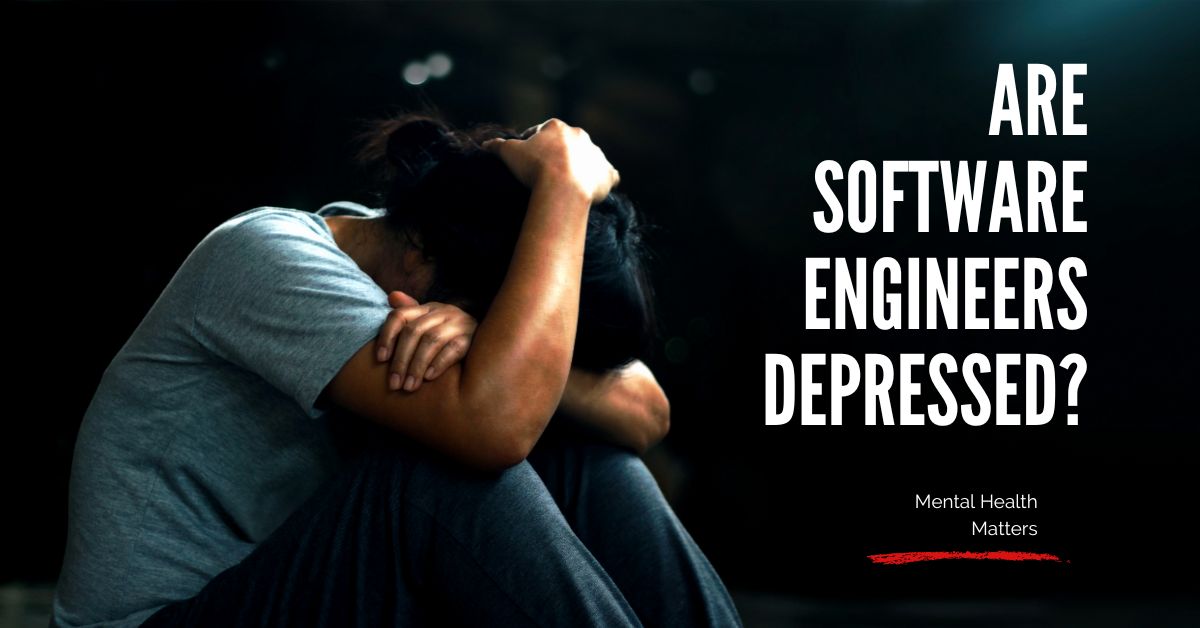Are software engineers depressed?
In a 2020 Developer Survey by Stack Overflow, participated by 65,000 developers, 15% of participants accepted to have some form of mental issues, including anxiety and depression as the most common ones. 15%, i.e., 9750 participants, is a very high number. Although very limited, this survey put the mental health of software engineers in the limelight..
Some people won’t even have the slightest idea that they are depressed or suffering from a mental health crisis.
Here are some questions you can ask yourself:
- Are you addicted to something you consider a bad habit yet cannot quit?
- Are you avoiding meeting people because you feel like meeting anyone?
- Are you being rude to people or getting annoyed at small matters?
If your answer is “yes” to most questions, I have some news for you.
So, why do software engineers and programmers suffer from depression and other mental health issues? The answer the not simple. I will try my best to explain from the point of view of a professional coder myself.
Firstly, programming skills are evidently in high demand worldwide, providing ample job opportunities with high salaries and perks. If you are good at it, your life is all set. However, that’s not how your mental health works.
Money (although in most cases) buys you happiness, but those moments of joy are short-lived, and before you know it, you are back at your life-consuming desk. Our brains need validation, satisfaction, and a sense of belongingness. Despite how introverted you are, there comes a time when you need to talk to someone. Unfortunately, coding is a time-consuming and brain-draining job..
The technology field is challenging.
Firstly, a software engineer must be 100% proficient in the technology/stack as per their skill. There is little to no room for error, as fixing a single mistake can sometimes consume hours of your day. Plus, the technological market is in constant evolution. If you learn something today, it may go extinct within a couple of years, and you must adapt to the new technology and achieve mastery in that.
You are constantly introduced to a new codebase from other developers. You need to understand business problems, translate them into codes, and find new methods to solve them. Overall, you have to learn a lot.
In one way, it could be fun as you don’t get bored doing the same job repeatedly, yet it could turn out to be a curse for some people.
The only way to fight the curse is to remain focused, resilient, and curious. These are essential characteristics one must follow until it becomes a habit.
The real challenge is to develop these habits in an overcrowded and overexposed environment. I don’t mean the Office, but the world of social media, news, notifications, tech blogs, etc.
Procrastination is a demon
As stated earlier, a software engineer’s job is to solve problems through constant innovation and sometimes improvisation. So, what happens if someone fails to solve a problem, especially when you constantly see how others are doing better than you on social media?
Here comes disappointment, self-doubt, and frustration that you feel scared of trying anything after. The only way to avoid these dreadful feelings is to postpone your work. Now the problem is procrastinating work doesn’t give you any form of happiness or relaxation. For instance, if failure or disappointment is scored 10, but procrastination lies between 7-8.
The truth is when software engineers start their job, they have no idea that the challenges they will face in the future are more than their education and skills. Procrastination happens when things become more burdensome, and people shut themselves off and suffer alone.
Because of coders’ problem-solving nature, they need to solve problems to feel delighted and satisfied. In short, they need their inner voice to say, “great job!”.
Now imagine the scenario of high work pressure in a fast-paced, extremely competitive, and diabolical social media environment.
Undoubtedly, every job has pressure, but when it comes to programming, it’s more depressing. Depression and passion are related to each other. So, programmers get depressed; their passion takes a back seat.
Social Isolation is another problem
Programmers may be stereotyped as socially awkward nerds, but that’s not the case. In fact, programmers are problem-solvers, and to solve a program, they have to discuss solutions with their team members and developers and report their findings & solutions to managers. Overall, they have to expand their networks to progress at their job.
Now, coding is a job that requires solitude. This is because you need that intense focus to look at the screen, use your brain, and type faster with your fingers. Working like that doesn’t give you the perk of emotionally connecting with anyone. As a result, co-workers are the only people with whom developers are in touch.
The problem with relying only on co-workers for social needs is that building or maintaining a friendship is complex. Fitting in with co-workers means you have to share their world views, including politics, arts, and other fields of thought. Besides, fitting in is even more challenging for minorities, maybe due to language & cultural barriers or simply due to discrimination.
This is problematic as loneliness not only increases the risk of suicide but also affects a person’s health in the long run. We all are social creatures, and even introverted ones need a sense of belonging every once in a while.
We need to talk about high screen time
As a developer, you spend your whole day in front of a screen, which often builds sedentary behavior in people. As per studies, high screen time is also linked to severe depression as the light emits from the electronic screen interferes with your melanin production and distracts your circadian rhythm.
Sleep deprivation due to high screen time is seen in people working nighttime and extra hours, freelancers, and people from different time zones. Needless to say, sleep is the pillar of health for a living being. One cannot achieve peak productivity if they keep pushing for sleep, and staying awake by consuming stimulants like caffeine or nicotine will further decrease sleep quality.
The Takeaway
Every profession has its own challenges to trigger mental health issues, and software engineering is no exception. Programming or coding is a sedentary, lonely, and brain-draining activity that requires a person to stare at a computer screen for hours and hours. Such actions, after a while, can increase the risks of low-quality sleep, lack of focus, diminished motivation, irritation, anxiety, burnout, and depression.



